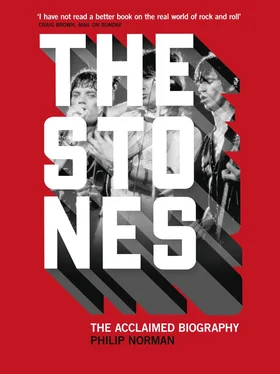The solid Stew had a steady daytime job as a shipping clerk with Imperial Chemical Industries in Buckingham Gate. His first impression of Mick and Keith was of semi-vagrants, permanently broke, shabby and ravenous. Mick had no money but his seven pound per week student grant, plus the few shillings he got for singing with Alex. Keith, at the point of expulsion from Sidcup Art College, was entirely dependent on handouts from his mother. ‘They looked like they were going to starve together. But Mick was rather better off. Every so often, he’d leave Keith and go off to a slightly better caff. Mick always was very fond of his stomach.’
The first spark of originality in the group was struck by spontaneous interaction between Brian on his Gibson guitar and Keith on his Hofner. They would play, not as lead and subordinate rhythm, but as a duet, matching one another solo for solo, merging in a natural two-amp harmony, one zigzagging down the bass notes as the other climbed into treble register. This emergence of a ‘two-guitar band’ seemed an infinitely more exciting prospect than the skinny LSE student who sat about patiently, awaiting his chance to sing. Even then, in the trio of Mick, Keith and Brian, the joining of two inexorably left the third one out in the cold.
The sound they made could be heard in the main pub and, one night, fell on appreciative ears. Later, in the bar, a middle-aged man came up and introduced himself by visiting card as ‘David Norris, Artists’ Representative, Cockfosters’. He told them he’d liked what he’d heard, and could get them some engagements in ballrooms and dance halls – perhaps even at military bases on the Continent – provided they got themselves some decent instruments and stage suits. Mr Norris, for his pains, was firmly snubbed. All five had vowed they would never sell out their music to the commercial world, even if it meant they never got a single engagement.
Alexis Korner remained the only real star in the blues firmament. And, in the summer of 1962, it seemed as if Korner’s meteoric career was about to leave Mick Jagger behind. Blues Incorporated had been offered their first nationwide broadcast, on the BBC Light Programme’s Jazz Club . There were, however, two drawbacks. The first was that the BBC appearance, on July 12, clashed with Korner’s regular Thursday booking at the Marquee. The second was that the BBC, with typical frugality, would pay for five musicians only. Korner must therefore shed the most dispensable one in his line-up, the vocalist.
Jagger did not mind being dropped. He was, on the contrary, anxious for Korner to seize this chance to bring blues to a national audience. It was arranged that the Marquee date should be filled by Korner’s original Ealing vocalist, Long John Baldry. For an intermission band, the Marquee’s manager, Harold Pendleton, agreed to give a chance to the group which had been rehearsing at the Bricklayer’s Arms, though with so little hope it did not yet have a name.
The engagement was sufficiently important to merit a paragraph in the July 11 issue of Jazz News .
Mick Jagger, R & B vocalist, is taking a rhythm and blues group into the Marquee tomorrow night while Blues Inc. is doing its Jazz Club gig.
Called ‘The Rolling Stones’ (‘I hope they don’t think we’re a rock and roll outfit,’ says Mick), the line-up is: Jagger (vocals), Keith Richards, Elmo Lewis (guitars), Dick Taylor (bass), ‘Stew’ (piano) and Mick Avory (drums).
The name was chosen by Brian, in honour of the Muddy Waters song Rolling Stone. Ian Stewart, for one, objected strongly to it. ‘The Rolling Stones – I said it was terrible! It sounded like the name of an Irish show band, or something that ought to be playing at the Savoy.’ Mick Avory, the drummer they had recruited, felt equally dubious, but accepted – as the others did – that, since Brian had formed the group, he could call it what he liked.
So on July 12, 1962, with a playing order written on a page of Ian Stewart’s pocket diary, the six Rolling Stones faced their first audience. Mick wore a sweater, Brian a cord jacket and Keith a skimpy dark suit which left his shirt collar and cuffs exposed like the surplice of the angelic choirboy he formerly had been. Behind them, Dick Taylor, Ian Stewart and Mick Avory glanced at one another ominously. ‘You could hear people saying “Rolling Stones … Rolling Stones …”’ Dick Taylor remembers, ‘“Ah … rock ’n’ roll, are they …” Before we’d played a note, we could feel the hostility.’
Britain in 1962 was a nation still predominantly interested in recovering from 1939. The only generation that mattered was the one which had survived the war and its scarcely less uncomfortable aftermath, inspired by a common belief that one day butter would cease to be rationed; that coupons would no longer be needed to buy clothing or chocolate. These miracles had come to pass – and more. In British homes, as in American ones seen on the cinema screen, there were now TV sets, washing machines, garages containing cars with fins. There were transistor radios, cocktail cabinets and ‘genuine champagne perry’. Harold Macmillan, prime minister since the Suez Crisis, could be believed when he told the country, ‘You’ve never had it so good.’ Largely through that powerful superstition, government remained firmly in the hands of an elderly Edwardian whose winged white hair and drooping moustache gave him the appearance of a dilapidated but complacent sea lion.
The decade which still had not defined itself in 1962 was actually starting to form in 1955, with early sightings of that problematical new species, the ‘teenager’. It was a species, however, which for the next five years caused little profound effect on British life. For it sprang almost wholly from what was still dismissively called the ‘working’ class. Rock ’n’ roll music, skiffle, long hair and coffee bars were condemned all in one as a deviation of the lower proletariat. ‘Pop’, the rock sound watered down, figured not much higher in the social register. Its most successful British exponent, Cliff Richard, owed his survival to having exchanged the grubby aura of the Rocker for that of a conventional show-business personality.
Change was coming, even now, in a battered van making its way to London from the unregarded northern city of Liverpool. In June 1962, the head of an obscure record label, Parlophone, gave an audition to four young Liverpool musicians who had, up to then, been rejected by all the major companies. Their first record – chosen with difficulty from an eccentric and uncommercial repertoire – was not released until the following October. The record was called Love Me Do; the group was the Beatles.
For the Rolling Stones, in October 1962, the most pressing question was whether they could survive another week. It scarcely mattered that their debut at the Marquee Club had gone better than any of them dared hope. To the club’s jazz and pure blues crowd, merely the sight of Dick Taylor’s bass guitar had been reason enough to detest them. But there had also been a contingent of Mods, up on the town from Wembley or Shepherd’s Bush, who loved Chuck Berry and Bo Diddley as much as Keith did, and – being Mods – had conclusively drowned out the jazz fans’ disapproval. That endeared the new group still less to Harold Pendleton, who ran the Marquee on behalf of the National Jazz League, and loudly disapproved of their music, their clothes, their attitude and – as it seemed to Ian Stewart – their perversely ill-chosen name.
The only further bookings Harold Pendleton would offer them were as dogsbodies, filling in for other bands that had not turned up. Often, after booking them, Pendleton would telephone Brian Jones and say he didn’t want them after all. On the nights when they did make it to the Marquee stage, Pendleton would indulge in sarcasm at their expense. Keith Richards was a frequent target, gawky and shy, with his skinny black suit and pimple-chapped face, playing the Chuck Berry guitar riffs that Pendleton so despised.
Читать дальше












